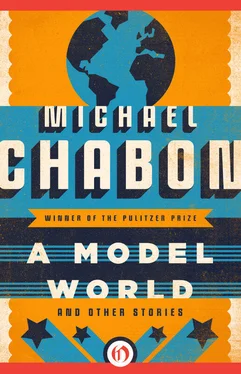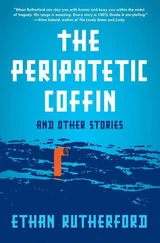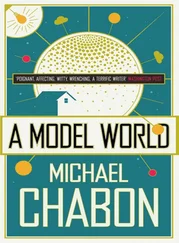Michael Chabon - A Model World And Other Stories
Здесь есть возможность читать онлайн «Michael Chabon - A Model World And Other Stories» — ознакомительный отрывок электронной книги совершенно бесплатно, а после прочтения отрывка купить полную версию. В некоторых случаях можно слушать аудио, скачать через торрент в формате fb2 и присутствует краткое содержание. Год выпуска: 2011, Издательство: Open Road Media, Жанр: Современная проза, на английском языке. Описание произведения, (предисловие) а так же отзывы посетителей доступны на портале библиотеки ЛибКат.
- Название:A Model World And Other Stories
- Автор:
- Издательство:Open Road Media
- Жанр:
- Год:2011
- ISBN:нет данных
- Рейтинг книги:5 / 5. Голосов: 1
-
Избранное:Добавить в избранное
- Отзывы:
-
Ваша оценка:
- 100
- 1
- 2
- 3
- 4
- 5
A Model World And Other Stories: краткое содержание, описание и аннотация
Предлагаем к чтению аннотацию, описание, краткое содержание или предисловие (зависит от того, что написал сам автор книги «A Model World And Other Stories»). Если вы не нашли необходимую информацию о книге — напишите в комментариях, мы постараемся отыскать её.
A Model World And Other Stories — читать онлайн ознакомительный отрывок
Ниже представлен текст книги, разбитый по страницам. Система сохранения места последней прочитанной страницы, позволяет с удобством читать онлайн бесплатно книгу «A Model World And Other Stories», без необходимости каждый раз заново искать на чём Вы остановились. Поставьте закладку, и сможете в любой момент перейти на страницу, на которой закончили чтение.
Интервал:
Закладка:
We’ve finished packing and we’re on the sofa, and I draw her big head down onto my lap; I hold it there. Her hair is always cool to the touch. The light in the living room, dim and pink through the heavy shade on the only lamp, tends to put us to sleep anyway, and now it’s 3 A.M.; Roksana is going under, eyelids fluttering. Every so often she stirs and struggles to free her hair from my twining fingers. She stiffens her neck, and against my thigh I feel the hardness of the muscles of her back. Now that I’ve mentioned Iran, she springs up and goes to perch on the other end of the sofa, black eyes, no nonsense. My lap feels cold.
“What about Iran?” she says. “Let’s not.”
“No, please.” I don’t really want to talk about Iran, either. We’ve had this conversation a thousand times before, but what else is there? About the things someone would write on an advertisement in the Metro. “I don’t know. The shah, the ayatollah.”
“Tell me what you think,” she says, barely, and yawns, and there again are the three gold teeth I bought for her. I had heard that toothache can cause profound, moral sadness.
“As far as I could see, um, the shah was an asshole and they threw him out, but he died anyway. And then the ayatollah came in, and he’s an asshole, too. And a bunch of sweaty guys were running around throwing Coke cans and setting American flags on fire.”
“That’s it,” she says. She stands up, I watch her black knit dress gather around her hips, then fall, one instant of yellow boxers. “I’m going to bed. Goodnight.”
Many things fill the distance between me and Roksana, and one of them is the nation of Iran. If you look at a map, I am the Caspian Sea, and she is the Persian Gulf. Once upon a time, I suppose, the whole place was underwater.
Roksana hoists our suitcases and we follow Hervé Heugel down onto the platform at Le Pouliguen, where we stand waiting for his mother or his father, I’m not sure which, to take us to the Heugel manor, or chateau , as Hervé calls it. I’ve known Hervé for about a month. He lives in our neighborhood in Paris and takes his morning coffee around the corner from our apartment, at the Voltaire, where one day he spotted my accent and my Velvet Underground T-shirt and, after I gave him the money for a croissant, became my friend. Though he looks kind of intellectual and severe — big forehead, pointy chin, rimless glasses, and a crew cut — it turns out that he has no interests other than the usual nonintellectual ones. He loves to laugh and to swear in English — the only English he knows. He and Roksana don’t like each other very much, although neither would ever say so. They can barely speak to each other, anyway. Hervé is arrogant, callous, and I often feel myself getting on his nerves, but he knows his garage bands of the late sixties, and he knows the city, and sometimes he drives me around Paris on the back of his motor scooter, his thin scarf flapping in my face. I think that if I met someone like Hervé in America, I wouldn’t make friends with him, but there are no people like him in America. And, anyway, friendship is different in another language; a foreign friend doesn’t have to understand what you feel, and I don’t expect it. It’s enough if he understands what you just said.
We can smell the sea now, and I look around eagerly at the tiny cars, the embracing families, the ancient candy machine rusting next to the men’s room, and at the low brown houses and scrub fields that surround the train station.
“She is there,” says Hervé. He pushes his stern little glasses up his nose, drops his Adidas duffel. When his mother reaches us, he takes her in his arms, gets it on both cheeks, and then presents us. His mother is short, a bit wrinkled but fine-featured, with motionless hair.
“Ah, the little Americans,” she says uncertainly. “Brine.”
“Brian. Brian Blumenthal,” says Hervé, fairly well. “And — Roksana — Khairzada.”
“Brine,” says Madame Heugel, and she takes my hand, a complex expression on her face — a smile-frown, or a polite sneer. Or just a face that is uncomfortable with our names, and with our presence, and with my wife, and with her own son. whom, I know, she considers lazy, sly, and overly fond of Americans, particularly of American girls.
She asks her son if we speak French; I answer for both of us. “I do, my wife regrets that she doesn’t.” Then Hervé takes her arm and off they go, speaking French, and we follow.
“She hates me,” Roksana says quietly.
“No, she doesn’t. Why do you say that?”
“It’s all right, I don’t care. She can hate me.”
I try to pull her to me, and I’m about to say again those three helpless words when she stops short.
“Look,” she says.
Behind the scratched display window of the candy machine is a brand of chocolate bar with an English name: Big Nuts. Roksana laughs. I buy one and put it in my pocket, and when we reach the Heugel Renault, I am still smiling.
“Oh, what beautiful teeth,” says Madame Heugel.
“Yes, they’re like that — American teeth,” says Hervé.
We eat outside, at a long table, and lunch is a mountain of steamed shrimp, a stacked cord of fresh asparagus, cider, and bread. Hervé’s father, who looks like Hervé—thin with a large head and a sharp nose — tells us in French about his trip to New York City in 1968. I am delighted by his account of a misadventure in “les Bronx,” and everything goes well until I notice that my plate is the only one on which mounts a pile of tails, shells, rosy filaments, and shrimp heads; Hervé and his parents are eating the entire shrimp, unpeeled. Roksana will not eat shrimp.
“No one told me what kind of a neighborhood I would have to walk through to get to the Cloisters,” says Monsieur Heugel, struggling with the word. He has shot five small fowl that morning and seems to be in fine spirits; I saw the brown and iridescent-green pile of birds on the kitchen table. “Harlem! Think of that! Full of blacks! Did I care?”
“Yes,” Hervé says.
“No, I did not. I walked right through. On my way home I had an appetite, I stopped at a little coffee shop, I bought a sandwich, I sat right down on the curb, in Harlem, and ate it. No one bothered me.” He smiles at his wife, who probably hears this story every time the Heugels feed an American, and she smiles and reaches to move his sleeve out of the butter dish. “I have nothing against blacks; you see.”
“Since when?” Hervé turns to me. “He’s completely prejudiced against blacks. Blacks and Arabs.”
Right away he puts an embarrassed hand to his mouth, and we all turn to look at Roksana — myself included, which makes me ashamed — who has no idea of what’s been said and continues calmly to eat her asparagus and bread, eyes to her plate. While Monsieur Heugel protests that he has known several Arabs who were very worthwhile fellows and, it must be said, skilled businessmen, and Hervésnorts and puts away fistfuls of shrimp, I push back my chair.
Our table is spread in the grassy clos between two of the estate’s several houses. On my right is an ivy-covered stone building with a turret, five chimneys, and fabulous eaves — the house of Hervé’s family; on my left, across the lawn, is one of the larger outbuildings, a brown barn that has been converted into a guesthouse. All around our table are bees and butterflies and giant oaks, the air smells lightly of manure and salt, and across from me, in the distance behind Monsieur Heugel, is the bay, filled with sails. I watch Roksana chew, closed, dark, mute, immovable, and I think: I am a fool.
“Oh, the little American,” says Madame Heugel, pointing delicately with her fork at my plate. “He will not eat the heads!”
Читать дальшеИнтервал:
Закладка:
Похожие книги на «A Model World And Other Stories»
Представляем Вашему вниманию похожие книги на «A Model World And Other Stories» списком для выбора. Мы отобрали схожую по названию и смыслу литературу в надежде предоставить читателям больше вариантов отыскать новые, интересные, ещё непрочитанные произведения.
Обсуждение, отзывы о книге «A Model World And Other Stories» и просто собственные мнения читателей. Оставьте ваши комментарии, напишите, что Вы думаете о произведении, его смысле или главных героях. Укажите что конкретно понравилось, а что нет, и почему Вы так считаете.












